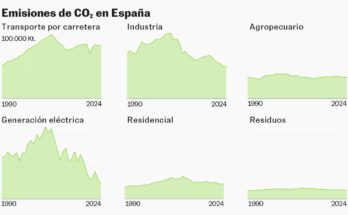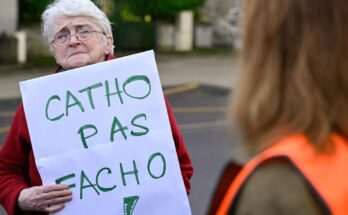Chilean leftist candidate Jeannette Jara won a bittersweet victory in the presidential election on Sunday. Although the communist militant obtained the majority of votes, 26.8%, and went to the run-off with the radical right-wing republican José Antonio Kast (23.9%), she has a very complex scenario between now and December 14, when the run-off will be held. The difficult part for the former Minister of Labor in Gabriel Boric’s government concerns the numbers: two other standard-bearers competed on the right, the libertarian Johannes Kaiser (13.9%), from the far right, and Evelyn Matthei, from the traditional right (12.46%), who together with Kast amount to just over 50% and have already announced that they will join the tie-breaker.
According to the sociologist and political scientist Alfredo Joignant, for Jara “the ballot is completely uphill, given that he has very little room for growth: to tell the truth, the election aims to end in a massacre if there are no geniuses or supernatural phenomena”.
Along the way, the populist Franco Parisi, of the People’s Party (PDG), also emerged, who was in La Moneda for the third time and was, as in 2021, the surprise of the elections: he obtained third place, with 19.71%. “It’s the Cinderella of this story,” Jara said half-seriously this Monday morning. Even if the economist was an opponent of Boric, “electorally speaking, the big question is knowing where the enormous vote” that he obtained will end up”, underlines Joignant in this article on EL PAÍS.
On Sunday evening, after learning the results, Jara wasted no time, and said he had looked at the ideas of the other standard-bearers: “I really appreciate the VAT refund proposal that is in Franco Parisi’s program,” he said. He also praised Matthei’s programme, supported by some politicians who were part of the former Concertación – the centre-left coalition that governed between 1990 and 2010 -, namely the reduction of waiting times for oncological treatments.
Jara not only obtained fewer votes than, on average, the polls predicted, which placed her at 28%. He also failed to reach what should have been his ceiling, tied to 30% support from Boric’s loyal supporters. The best scenario, desired and necessary to aspire to a good performance in the second round, was to get at least close to the 38% that in September 2022 supported the failed project for a new Constitution proposed by the left in a plebiscite. In that exit referendum, with compulsory voting, like this presidential one, that was the weight of progressivism. But Jara is more than 10 points below that percentage.
The vote for Jara is inevitably associated with Boric’s performance, despite having carried out, as Minister of Labor, initiatives that both his campaign and the left-wing administration boast of: the pension reform – with the support of the traditional right in Congress -, the law that gradually reduces the working day to 40 hours per week and the historic increase in the minimum wage. However, the president also has a strong rejection of 62%, as indicated in the latest survey by the Center for Public Studies (CEP), in October. For Adolfo Ibáñez University professor Carmen Le Foulon, this factor is very relevant: “Jara has something against him that Boric didn’t have: he comes from a government with a very low level of approval.”
At the beginning, the young government of the Frente Amplista, which in 2021 won Kast in the second round with 55%, generated great expectations and promises of change, but in many of them it failed to keep them. For example, his tax reform, which in Congress, where he did not have a majority, did not even approve the idea of legislating and starting the debate. But also because a good part of his program was based on the certainty that the new Constitution would be approved in 2022.
“Jara’s weak result” is also “a judgment on the management of Gabriel Boric’s government, which is approaching the end of its four-year mandate (in March) with poor economic, social and security results,” says journalist and political writer Ascanio Cavallo. For him, Boric governed “confident in the apparent escape of the so-called social epidemic of 2019” and “on the basis of a series of assumptions that quickly turned out to be wrong and their subsequent correction – which some regarded as a profound social democratic turn – was not only incomplete, but left the economy on the brink of a ruinous state, supported only by the strength of its institutions, in particular the Central Council and the Fiscal Council, both autonomous”.
Kast has strategically taken advantage of the relationship between the candidate and the president several times, especially this Sunday, when she went to the second round. “Jeannette Jara is Gabriel Boric. With a different tone of voice, with a different way of being, but it’s the same political project.”
Jara must now turn to the center, and also look for the non-ideological, or anti-elite, voters that Parisi has attracted. He also insists on his announcement to suspend or freeze his communist militancy – he has been there for 37 of his 51 years – as an urgent gesture: he is aware that this has caused him problems. Furthermore, he must convince that insecurity, the main concern of citizens – a point on which Kast has focused his campaign – is his priority. “Don’t let fear freeze your hearts,” was the first thing he said after the results.



